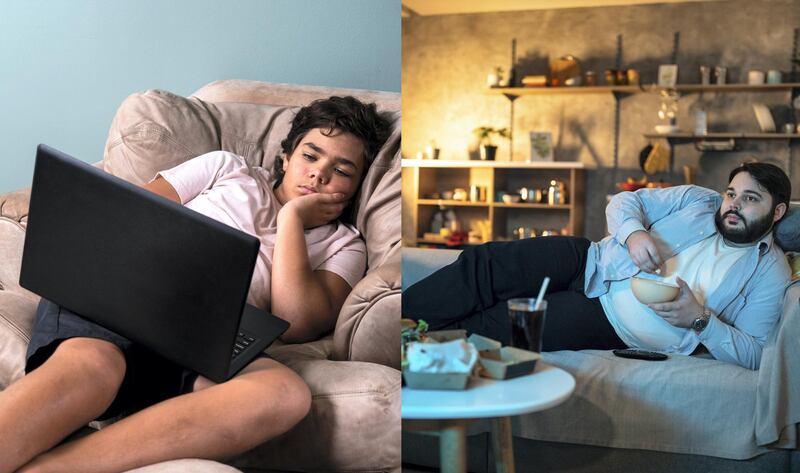Not long ago, the world would wait a whole week between each captivating episode of its favourite television show. Process that for a second, and then compare it to today's streaming culture, where it has become the norm to watch episode after episode, maybe even a whole series across one or two sittings.
Recent research by Radio Times in the UK suggests that half its sample viewers had watched an entire series in a single sitting and that four-hour stints were regular practice. The trend of this unlimited access began back in 2013, when Netflix released House of Cards, said to be the first time viewers were able to watch a show back-to-back. Since then, viewing habits have changed completely.
With exciting shows accessible on a regular basis, and the cost of Netflix, other channels and catch-up facilities more affordable than ever, binge-watching has become a modern epidemic. Research is steadily emerging that lists the detrimental effects of the trend and health experts warn it marks the dawning of a new challenge
The physical fallout
The problem, says Dr Tamara Ghazi, medical director at Diversified Integrated Sports Clinic, is lack of moderation. With addictive shows only a click away, people are becoming more glued to the sofa and suffering the physical effects. "It's causing more back issues and weight gain from lack of movement," she says.
Sitting still is one of the biggest culprits of poor health today, and a basic tenet of binge-watching. Ghazi explains that sitting for long hours, often in a reclining position, creates compression in the discs, compression in the glutes and hip flexors, which leads to lower back pain, and gradual weakness in the spinal muscles, which are associated with maintaining posture.
As sitting weakens the pectorals (chest muscles), it pulls the shoulders forward, and adds stress to the shoulders and upper back. The neck suffers, too, causing chronic neck pain and headaches. With most people working desk jobs, this all exacerbates an already widespread lower back pain pandemic, one of the most commonly manifesting conditions seen by physical therapists these days.
Ghazi adds that a sedentary lifestyle aside, streaming has even impacted the way we socialise. “Let’s watch Netflix has become a socially acceptable entertainment appeal over let’s go to the movies or to meet friends, let’s go for a walk or out for dinner.”
Escapist tendencies
Mental health experts see issues emerging, too. Dr Tara Wayne, clinical director at The Lighthouse Arabia, says binge-watching is used as a “passive coping strategy” when people are feeling anxious, depressed or avoiding situations, relationships or responsibilities. “What is concerning is that they do not feel any different or better after they have binge-watched. They are still stuck and will need the same ‘fix’ or solution again the next time they are faced with unpleasant emotions,” she explains.
Patients often report that watching shows causes them to go to sleep later than intended, to forget and avoid studies, work tasks or domestic responsibilities, and even avoid friends and family members at times to be able to continue watching TV.
This method of self-soothing is then justified by patients, who grow dependent on this feeling to regulate emotions and, in turn, it can breed addictive behaviour. "When you rely on it, you will defend the behaviour. You might start to be more covert and even sneaky to maintain it," says Wayne.
Children are the most vulnerable

"I see this with adults and particularly young people. Kids and teens get hooked on the narrative and content they consume. Their frontal lobes and executive functions are underdeveloped and not strong enough to tell them to be reasonable or remind them of the consequences. Consequently, they will most often give in to their desire to keep watching, and defend their behaviour to the hilt because they can't see the downside nor the dangers of becoming addicted, dependent and withdrawn from people and activities that are so essential to their well-being." Gradual reduction in time spent viewing is the only way to ease out of the habit, says Wayne.
Remember, too, that children learn mainly through vicarious processes. They observe and copy their parents, who need to improve their habits and provide them with a better model. For instance, screentime just before bedtime is a complete no-no. Last year, researchers from Penn State identified potential sleep and nutrition problems in children who used devices before going to bed. The study, published in the Global Paediatric Health journal, reported less sleep, poor sleep quality, tiredness during the day and a higher body mass index (BMI) among those who had access to screens just before they were meant to sleep. "Students getting less sleep than needed have their capacity to learn greatly diminished as it is while we sleep that our brain processes and internalises all the learning of the day," says Bronwyn MacRitchie, a holistic health coach in Dubai.
Sleep deprivation
Dr Irshaad Ebrahim, medical director at The London Sleep Centre, Harley Street, says another risk when consuming content on devices is the blue light they emit. This overstimulates the brain, making viewers feel they are wide awake, thus leading to sleep deprivation. "It can affect the sleeping brain as it will suppress melatonin [sleep hormone] secretion," he explains. Over long periods, chronic sleep deprivation can lead to reduced immunity, depression, anxiety and obesity.
Warning signs include headaches, vision strain and fatigue, but Ebrahim also recommends taking breaks between episodes to move and rest the eyes.
Eye health
Eye health and vision impairment is another detrimental side effect of staring at a screen for hours on end. Dr Ivana Romac Coc, from the Eye Institute at Cleveland Clinic Abu Dhabi, says long stints of viewing can affect our eyes in different ways. "While watching television or using screens, we blink half as much as our normal blinking rate, which causes the eyes to become dry. People with dry eyes can experience a burning sensation, heavy or tired eyes, eye strain, blurry vision and headaches," she says.
Although she says prolonged screen use does not cause permanent damage, symptoms get worse over time if not treated early. She suggests cycles of watching for 20 minutes then taking a 20-minute break, or at least pausing between shows, and recommends getting regular eye tests.
The effects on children are greater, she says, so it's evermore important to limit screentime and increase exposure to natural daylight, which is critical to healthy eye development. "If they spend more time indoors due to screen use, there is a higher risk for developing myopia [nearsightedness]. They can experience eye fatigue due to close-focus attention, in addition to dryness and irritation of the eyes caused by reduced blinking."
Binge-eating on the side
MacRitchie, who is also a nutrition expert, says diet, too, tends to take a back seat when binge-watching, and that often a sedentary lifestyle and poor food choices go hand in hand. This has grown alongside a culture of ordering in, and is a recipe for metabolic diseases such as obesity, diabetes, heart disease, strokes and cancer.
“The association the brain makes between the increased dopamine from the continued watching and the very often unhealthy snacks and takeaway food, becomes cemented in the neural pathways. What we find on our hands is an addiction to the binge-watching coupled with unhealthy eating,” says MacRitchie. “A single addiction is difficult to overcome, but one where the brain is releasing dopamine from two stimulants at the same time is twice as hard.”







